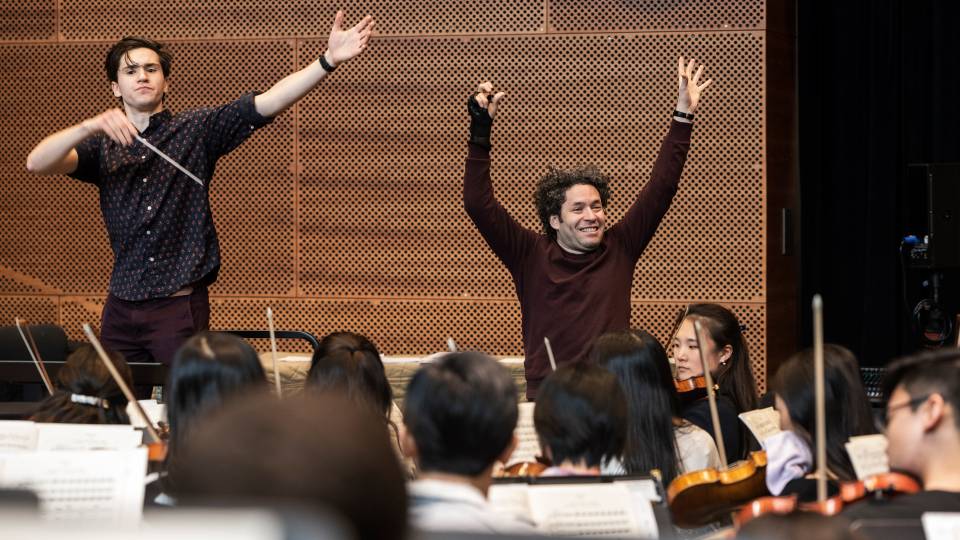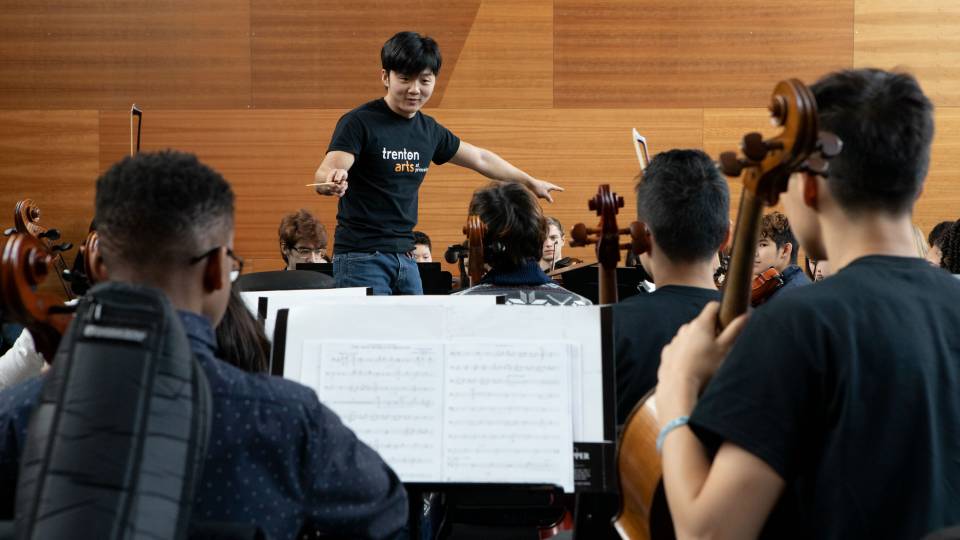Laura Bond may have been sitting in a darkened Taplin Auditorium listening to a jazz performance of music from the early 20th century. But, as the history teacher from West Windsor-Plainsboro High School North later described it, the music transported her to another place.
She could “see” herself in a night club, watching elegantly dressed couples gliding across dance floors. She could “hear” clinking cocktail glasses. She could “smell” smoke and perfume.

In between jazz sessions, history teachers participating in the seminar, including Laura Bond, drilled orchestra leader and musicologist Giordano with questions.
And it was all due, she said, to the music of Vince Giordano and his Nighthawks, who performed as part of the James Madison Seminars on Teaching American History on campus earlier this month.
From the authentic sounds, including the “wah-wah” of a muted trumpet, to the period tuxedos of the musicians, Giordano and his band members convincingly conveyed a sense of the 1920s, 1930s and 1940s, mixing elegance and optimism in hot tunes with names like “Oh, Eddy” and “My Pretty Girl.”
“It’s really amazing how powerful music can be and how it can affect you, bringing us to this earlier time,” Bond said. “I could feel the excitement and the hope for the future.”
Such insights are precisely what Bradford Wilson is hoping to engender in the seminar, the third and final installment for 90 New Jersey history teachers of a three-year series on American constitutional thought and history.
“We always include cultural components in our seminars, whether they be trips to museums in New York, Newark and Philadelphia, or musical performances representative of the period under consideration,” said Wilson, the associate director of the James Madison Program in American Ideals and Institutions(Link is external) at Princeton. “The third year of the seminar includes that great American contribution to world music -- jazz, with its intricate, very democratic interplay of individual freedom and creativity within the context of an ordered whole.”

With their foot-tapping music, members of the orchestra rose to the occasion of displaying how jazz tunes of the early 20th century exemplify a time that valued elegance and optimism.
The seminars, he said, mesh perfectly with the goals of Princeton’s Madison program, with its mission of advancing the understanding of American ideals and institutions. “We’re confident that as the knowledge of teachers increases and their appreciation of the complexity of American constitutional history is enriched, their students will benefit in similar ways.”
Teachers in the program agreed that the performance made the history come alive. “It’s one thing to read about music and its context in history,” said Len Miller, a history teacher at the Lawrenceville School. “It’s another to hear it. It means so much more.”

Andy Stein played the phonofiddle -- a cross between a violin and a phonograph horn -- evoking the sounds of a bygone era.
The performance, titled “The Golden Age of American Popular Music: Vince Giordano and His Nighthawks,” featured the New York-based orchestra and its 11 musicians playing everything from the “phonofiddle” -- a curious cross between a violin and a phonograph horn -- to three kinds of saxophones, with many musicians playing multiple instruments, including clarinets and violins, in the course of one song.
The pieces ranged from happy, foot tapping numbers, to more somber, bluesy tunes. “People were able to dance to this and have fun,” Giordano said. The orchestra leader, who also plays the string bass, tuba and bass sax, said he became interested in the period music as a boy, listening to his grandmother’s record collection. His friends derided the tunes as “cartoon music,” but he loved the sound for its intensity.
“Body and Soul,” a 1930s ballad, featured Pete Anderson, a 21-year-old Juilliard student touring with the orchestra, in a moving solo on the tenor sax. Dan Block, another member of the orchestra who has also performed on Broadway, enjoys playing the period music. “I like to play as many musical styles as possible,” he said. “One feeds the other.”

A critical part of the summer seminar was its cultural component, exposing teachers to art forms representative of the period being studied. Teachers such as Len Miller (far left) heard for themselves how jazz reflected its era and the ideals of democracy.
Teachers said the performance -- and the seminars -- left them inspired.
“I leave here finding myself re-energized, revived and re-committed,” said Miller.
The seminars are co-sponsored by the Philadelphia Museum of Art and the National Association of Scholars. They are part of a nationwide effort funded by the federal Teaching American History Grant Program.






